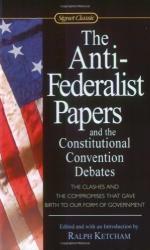
|
| Name: _________________________ | Period: ___________________ |
This test consists of 15 multiple choice questions and 5 short answer questions.
Multiple Choice Questions
1. What did "Centinel" argue on the danger of checks and balances?
(a) He argued that checks and balances would obscure corruption and tyranny.
(b) He argued that checks and balances would make the government slow to respond to military threats.
(c) He argued that checks and balances would create an endless torrent of inter-branch lawsuits.
(d) He argued that checks and balances would paralyze the government.
2. What was the original proposal for the residency requirement for citizenship?
(a) 7 years residence.
(b) 2 years residence.
(c) 14 years residence.
(d) American birth.
3. What did Rhode Island propose in its ratification process?
(a) To expand the government's ability to tax.
(b) To give the people freedom of speech.
(c) To give the states the right to appoint politicians.
(d) To give the people the right to bear arms.
4. What did "Federal Farmer" complain about in his second letter?
(a) The government was allowed to do anything it felt necessary to govern.
(b) That there is no bill of rights.
(c) The government could impose too many taxes.
(d) The Supreme Court had too much power.
5. What did Madison advocate concerning the election or appointment of the executive?
(a) Election by the people would hurt the public interest.
(b) Election by Congress would hurt the public interest.
(c) Appointment by an electoral college would be best.
(d) Appointment by the Supreme Court would be best.
6. What did James Wilson argue concerning the question of taxation?
(a) He argued that the government would use tax money wisely.
(b) He argued that it was necessary.
(c) He argued that the European nations were taxed more heavily.
(d) He argued that it would result in better services.
7. What was the vote tally when the Pennsylvania Convention voted on the Constitution?
(a) 35-34.
(b) 51-18.
(c) 46-23.
(d) 36-33.
8. What is the current residency requirement for citizenship?
(a) 4 years residence.
(b) 10 years residence.
(c) American birth.
(d) 7 years residence.
9. What was eliminated from the Constitution draft?
(a) Property qualifications for office.
(b) Protections against taxes on slavery.
(c) Restriction on imports.
(d) Laws governing territories and provinces.
10. What did "Brutus" say was the danger of a standing army?
(a) It turned countries toward tyranny.
(b) It created loyalty only to itself.
(c) It did not answer to the legislature.
(d) It consumed necessary resources.
11. What did "Federal Farmer" say the current Constitution would lead to?
(a) Aristocracy.
(b) Tyranny of the mass.
(c) Chaos.
(d) Tyranny.
12. Which committee recommendation did not make it into the Constitution?
(a) Four year terms for President and vice-President.
(b) Senate can amend budget bills.
(c) The Electoral College.
(d) The Senate should choose the President in case of a tie in the Electoral College.
13. What compromise did the Northeast states reach with Georgia and South Carolina over slavery?
(a) Northern states will regulate slavery if southern states will have lower tariffs on exported raw materials.
(b) That northern states will legalize slavery if southern states will prohibit importation of slaves.
(c) New England would not restrict slavery if the southern states will not require 2/3 majority to pass commercial restrictions.
(d) That northern states will not regulate slavery for fifty years, if southern states will abolish it themselves in that time.
14. How many delegates signed the Constitution?
(a) All but thirteen.
(b) All but three.
(c) All but twenty-three.
(d) All of them.
15. What symbol did Benjamin Franklin remark on, on the President's chair?
(a) An eagle on the seat.
(b) A pine tree.
(c) A sun painted on the back.
(d) An ocean and a ship.
Short Answer Questions
1. What did Benjamin Franklin say about supporters of the residency requirement for citizenship?
2. What powers did Mr. Mason argue the federal judiciary should not have?
3. What position did "Federal Farmer" take concerning the Constitution?
4. Who was the "Federal Farmer"?
5. What did Patrick Henry say was the end of government?
|
This section contains 718 words (approx. 3 pages at 300 words per page) |

|




